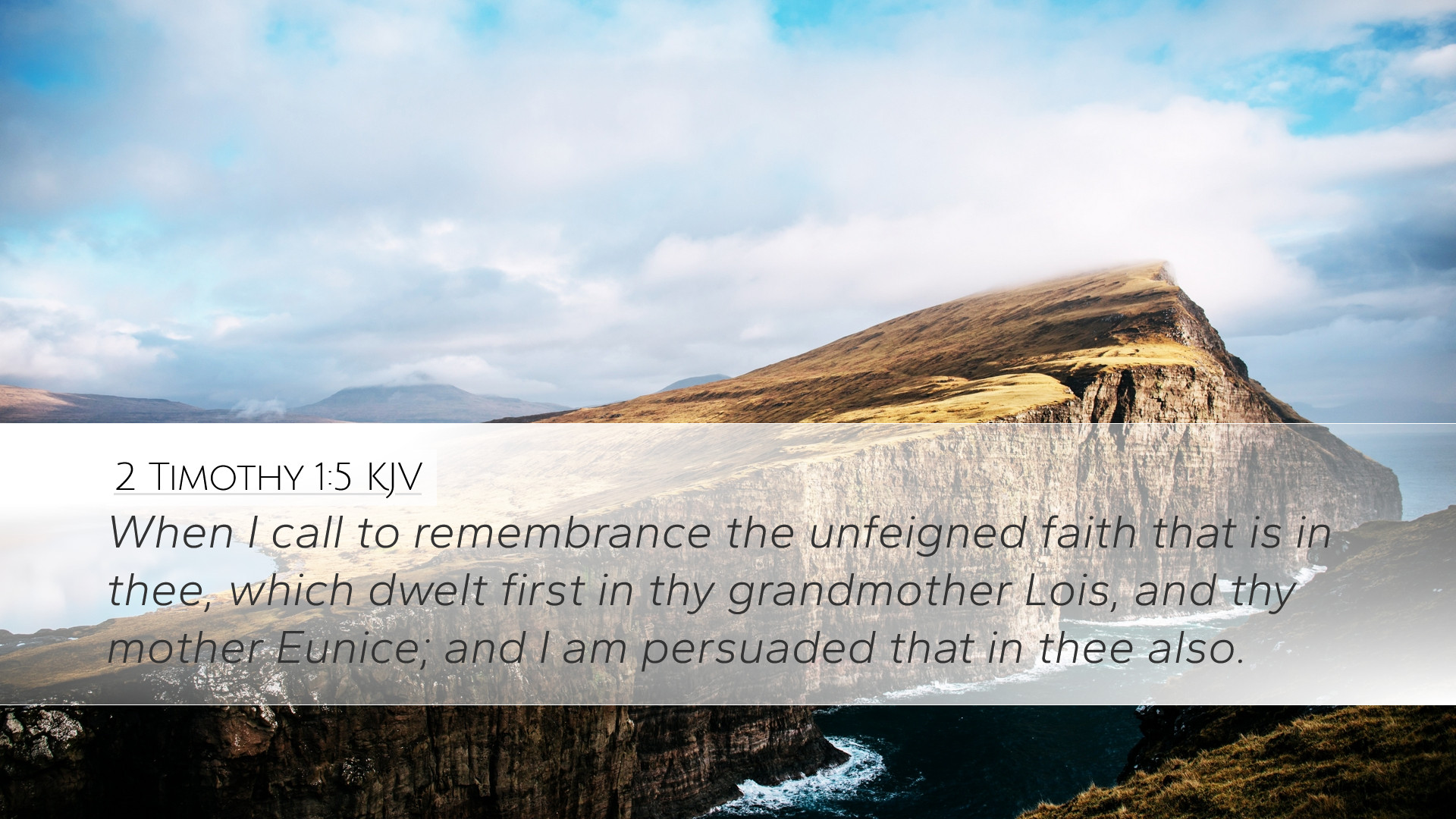Old Testament
Genesis Exodus Leviticus Numbers Deuteronomy Joshua Judges Ruth 1 Samuel 2 Samuel 1 Kings 2 Kings 1 Chronicles 2 Chronicles Ezra Nehemiah Esther Job Psalms Proverbs Ecclesiastes Song of Solomon Isaiah Jeremiah Lamentations Ezekiel Daniel Hosea Joel Amos Obadiah Jonah Micah Nahum Habakkuk Zephaniah Haggai Zechariah Malachi2 Timothy 1:5
2 Timothy 1:5 KJV
When I call to remembrance the unfeigned faith that is in thee, which dwelt first in thy grandmother Lois, and thy mother Eunice; and I am persuaded that in thee also.
2 Timothy 1:5 Bible Commentary
Commentary on 2 Timothy 1:5
Verse: "When I call to remembrance the unfeigned faith that is in thee, which dwelt first in thy grandmother Lois, and thy mother Eunice; and I am persuaded that in thee also." (2 Timothy 1:5, KJV)
Introduction
This verse presents a profound reflection on the nature and transmission of faith within a family. The Apostle Paul, writing to Timothy, emphasizes the genuine and sincere faith that Timothy possesses, which has its roots in his family lineage. The mention of Timothy's grandmother Lois and mother Eunice illustrates a biblically approved model of faith passed down through generations.
Insights from Public Domain Commentaries
Matthew Henry’s Commentary
Matthew Henry highlights the significance of unfeigned faith, contrasting it with mere outward expressions of faith. He notes that Timothy's faith was not only genuine but also deeply rooted in his upbringing. Henry points out that the faith of Lois and Eunice preceded Timothy's, indicating that faith can indeed be cultivated through nurture and example.
Henry elaborates that the mention of women in this verse is significant, emphasizing the influential role of mothers and grandmothers in spiritual formation. He encourages readers to recognize the importance of familial faith as a foundation for personal belief and practice.
Albert Barnes’ Notes on the Bible
Albert Barnes delves into the phrase "unfeigned faith." He explains that this refers to a faith that is sincere, genuine, and devoid of hypocrisy. Barnes underscores how the construction of faith within Timothy is not merely a private affair; it is an inheritance from the strong faith exhibited by his grandmother and mother.
He further observes that Timothy’s unique position as a young leader in the church is partly due to the religious training he received from those pivotal female figures in his life. Barnes encourages believers, particularly parents and grandparents, to nurture faith in their descendants, drawing upon the legacy conveyed by Lois and Eunice.
Adam Clarke’s Commentary
Adam Clarke emphasizes the significance of the family unit in the development of faith. He notes that Paul’s affirmation of Timothy serves as an encouragement, reinforcing that strong, steadfast faith is often cultivated within the home. Clarke elaborates on the historical context, suggesting that Lois and Eunice likely faced considerable challenges while maintaining their faith, thereby exemplifying resilience.
Clarke also points to the idea that Timothy's faith was not only received from his mother and grandmother but also had a direct connection to the teachings of the Scriptures, which they would have imparted to him. This highlights the role of education in faith formation.
The Theological Significance of Family Influence on Faith
The verse underlines a vital theological point: faith is often nurtured within familial contexts. Paul’s pastoral approach illustrates how the influence of earlier generations can profoundly affect the spiritual journeys of their descendants.
- Generational Transmission: The faith demonstrated by Lois and Eunice conveys that spiritual legacies are vital. They serve as examples to new generations, showing that authentic faith is likely to inspire others.
- Sincerity in Faith: The emphasis on “unfeigned faith” teaches believers that sincerity is paramount in one's relationship with God. Hypocrisy and pretense have no place in true faith.
- Encouragement for Mentorship: The model of faithfulness displayed by Lois and Eunice encourages not just biological relationships but also spiritual mentorship within communities of faith.
Contemporary Application
For pastors, students, and theologians, this passage illuminates the importance of nurturing faith in various settings. Here are ways to apply these insights today:
- Build Family Faith: Encourage family members to participate in spiritual practices. Families can engage in Bible studies, prayers, and discussions about faith.
- Foster Genuine Connections: Lead by example and cultivate environments where faith can thrive without deceit. Authenticity in faith practice is crucial.
- Mentorship Programs: Establish programs within congregations that promote mentorship, ensuring that mature believers invest in the lives of younger believers.
- Community Engagement: Extend the family model to churches, seeing them as spiritual families that can offer support and nurture faith.
Conclusion
In summary, 2 Timothy 1:5 provides an essential lesson on the significance of familial ties in the development of faith. The recognition of Lois and Eunice for their unwavering faith encourages us to reflect on the legacy we are creating. This passage implores believers to cherish the influence they have within families and communities, recognizing that genuine faith can be both owned and shared across generations.


